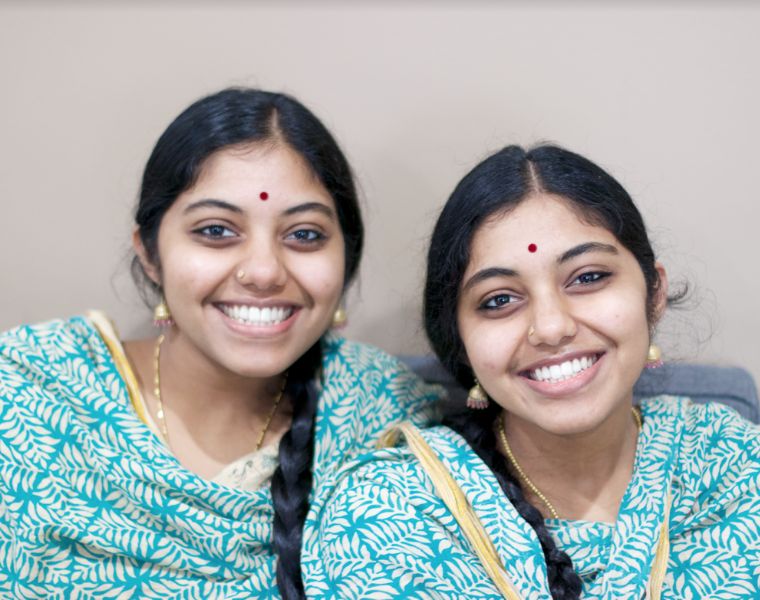Twins Vihisha and Havisha Bache need not look far for a study partner. After completing their undergraduate degrees at Case Western Reserve in biology and sociology in 2021, the Pennsylvania natives opted to continue their studies at the university through the School of Dental Medicine. In their first year in the Doctor of Dental Medicine (DMD) program, they have already started charting their future career paths, and—perhaps unsurprisingly—have found they have similar aspirations.
Vihisha, with input from Havisha, shared what the siblings’ experiences at CWRU have been like so far, from their undergraduate studies to dental school and beyond.
Some answers have been lightly edited for length and style.
1. What drew you both to CWRU?
When we were applying to undergraduate programs and visiting schools, we really loved the campus because of how welcoming and friendly the staff and faculty were. When we walked around, it felt like there was a beautiful balance of nature, technology and medicine; the Cultural Gardens and the Metroparks being nearby was really wonderful to hear about, and the different hospitals and clinics at each corner really inspired us for our goals in the healthcare field. Furthermore, it was really nice that the school didn’t mandate dorms because we both love being with our family and spending as much time with each other as possible.
2. What’s it like to go to school with your twin? Do you think that’s shaped your educational experience at all?
We both are each other’s best friends, so it’s like having your playmate with you all the time. Since a young age, Havisha and I have been learning Indian and Western classical music as well as violin, and we learned Sanskrit as well, on top of our mother tongue (Telugu), so having a partner to practice music, duets and language with really solidified ourselves as friends and study partners. I don’t have to look anywhere for my best friend because she’s always right next to me. We study really well together too, because Havisha will excel in something I need help in, and vice versa. I definitely think it has shaped my educational experience because we both are constantly trying to figure out the best way to help each other when we need help.
3. What about dental medicine appealed to you? Did you separately decide to go this route?
Dental medicine isn’t just a “field of medicine,” but an art form. The entire process of treatment and healing is very artistic, in that we are involving many techniques of pottery and sculpture. We are both very interested in art, and while shadowing a dentist, thought it would be a wonderful integration of our interest in health sciences and art.
4. How have you each been involved on campus?
During undergrad, Havisha and I were both teaching assistants, supplemental instructors, and tutors for many different classes. Our mother taught us the importance of sharing and giving back anything, especially knowledge, and it was really rewarding to work with students. We were briefly involved in research with the bioethics department before COVID put an end to things. The research was going to be studying the ethics of skin grafts on monozygotic twins.
5. What have been your most rewarding dental experiences so far?
Havisha and I both volunteered in many different clinics, so we’ve been able to meet many people of different backgrounds. After our two weeks of sealants, we both agreed that meeting children and placing sealants for them was one of the most rewarding dental experiences so far. The earlier children are comfortable with the dentist, the more attentive to their dental care they are; knowing this, we both were motivated to help the children understand the importance of dental hygiene while also making them as comfortable, calm and confident as possible.
6. After completing the program, what are your career goals?
Havisha and I would really love to help patients understand from the beginning that dental health is just as important as physical and mental health. Education along with treatment is one of the best ways to help patients gain awareness of the significance of dental hygiene. Volunteering in low-income areas, just like the dental school’s sealants program and Student Run Health Clinic does, is also very inspiring, and it is something we would love to continue doing as well.

